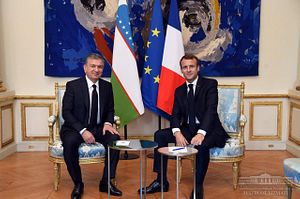Europe-Uzbekistan relations are dominated by Germany. Indeed, Germany’s exports to Uzbekistan are the highest among Western European countries – accounting for 5.1 percent of all Uzbek imports, according to 2016 data. Nevertheless, Uzbek President Shavkat Mirziyoyev chose to visit France first, ahead of a planned trip to Germany in January 2019. Germany’s busy political season this fall and the precarious position of Chancellor Angela Merkel and her party perhaps contributed to the French stop being made first.
Uzbekistan’s exports to Europe are small, but unlike dominant German imports, France is slightly ahead of Germany for importing Uzbekistan’s goods — accounting for 0.93 percent of total Uzbek exports versus 0.36 percent according to 2016 data. Given that Uzbekistan has been running a negative trade balance since 2007 and Mirziyoyev is pushing to expand entrepreneurship to grow the country’s export potential, export partners are more significant for Uzbekistan. In addition, French tourists to Uzbekistan topped visitors from other countries, according to the latest estimates.
Mirziyoyev’s trip to France took place on October 8-9. It was the first state visit there by an Uzbek president in 22 years; late President Islam Karimov traveled to Paris in 1996. It has been 24 years since the last French president visited Uzbekistan.
Although the security situation in the region and in Afghanistan were a part of last week’s high-level discussions, much of the visit was focused on the Uzbek search for investments.
Mirziyoyev’s trip to France was akin to the CEO of a company advertising business opportunities to attract investors. As Mirziyoyev met with a number of large French companies –Total, Total Eren, Orano, Fives Stein, Rungis Semmaris, Vinci, Suez, Sad, IDEMIA, Merci, and Thales Alenia Space among them — he spoke about the recent transformation of Uzbekistan into a more business and investor-friendly country. To showcase the new Uzbekistan, he spoke about the changes undertaken lately to ease foreign trade and simplified customs and tariff control as well as upcoming changes in taxation policy. In addition, Mirziyoyev spoke of his close oversight of investment matters through the Council for Foreign Investments created under the president, as if to guarantee speedy resolution of any issues that French companies might face in the future.
Mirziyoyev’s business pitch paid off, as the trip resulted in investment contracts worth 5 billion euros ($5.7 billion). The exact distribution of the contracts was not announced. What information surfaced was that 600 million euros from the French Development Agency will be allocated to infrastructure projects. Bouygues Bâtiment International SAS will spend another 100 million euros on the development of a tourist zone in Bukhara. The National Bank of Uzbekistan, Uzbekistan’s largest investment bank, also received a loan of 800 million euros from Credit Agricole S.A. and NATIXIS, most of which will be spent to import high-tech equipment.
The announced distribution of investments adds up to 1.5 billion euros. Assuming that amount is included in the 5 billion euro agreement, the remaining 3.5 billion euros are left unaccounted for. Right before Mirziyoyev’s official visit, it was speculated that the largest chunk of contracts would be with Orano. Orano is a French nuclear power company that offers a wide range of expertise from mining uranium to engineering and building nuclear utility facilities. Given that Uzbekistan is one of the world’s largest suppliers of uranium, with reportedly 186,000 tons of proven sources of uranium, and Uzbekistan’s recent interest in building its first nuclear power plant, potential cooperation amounting to several billion euros with Orano is realistic. Russia was chosen, however, as the builder of the planned nuclear power station; therefore, the French company’s involvement would be narrowed to uranium mining and possibly converting mined uranium into nuclear fuel either for its own purposes or for Uzbekistan’s domestic use.
Mirziyoyev’s first trip to Europe accomplished the purpose of projecting him as the liberal leader of a transforming Uzbekistan. Even in between official meetings Mirziyoyev did not stop projecting his liberal views. Caught off-guard, Mirziyoyev assured the BBC’s Uzbek Service that it would get a permit to return to Uzbekistan when a service representative shouted out the question of when such permission will be granted. (In July 2017, the BBC’s Uzbek Service said it was on the verge of restarting operations but official accreditation has yet to be granted).
Mirziyoyev presented Uzbekistan as open for business with French companies. The trip, in part, demonstrated a desire to diversify partner countries if indeed talk about Orano comes out to be true. The nuclear station is a very strategic project and French partnership in that aspect would be important. Lastly, as a leading Western democracy, France’s warm welcome to Uzbekistan’s president and openness to the new chapter of the partnership has a lot of symbolic value for Uzbekistan.

































